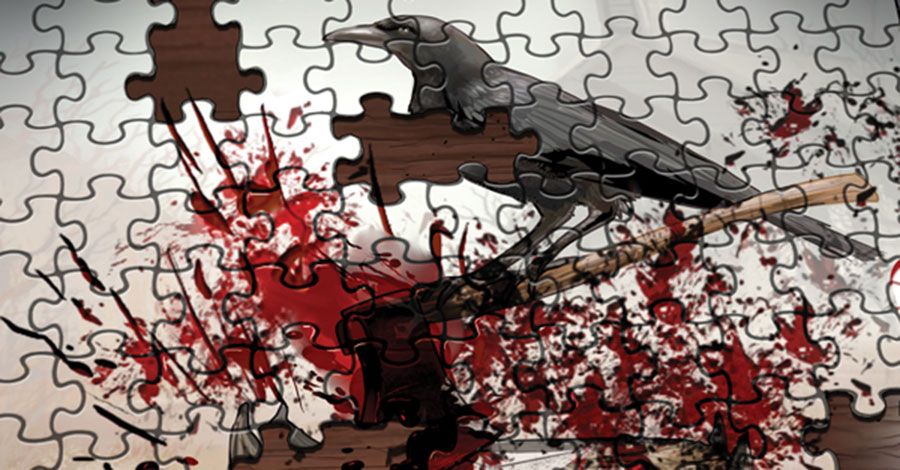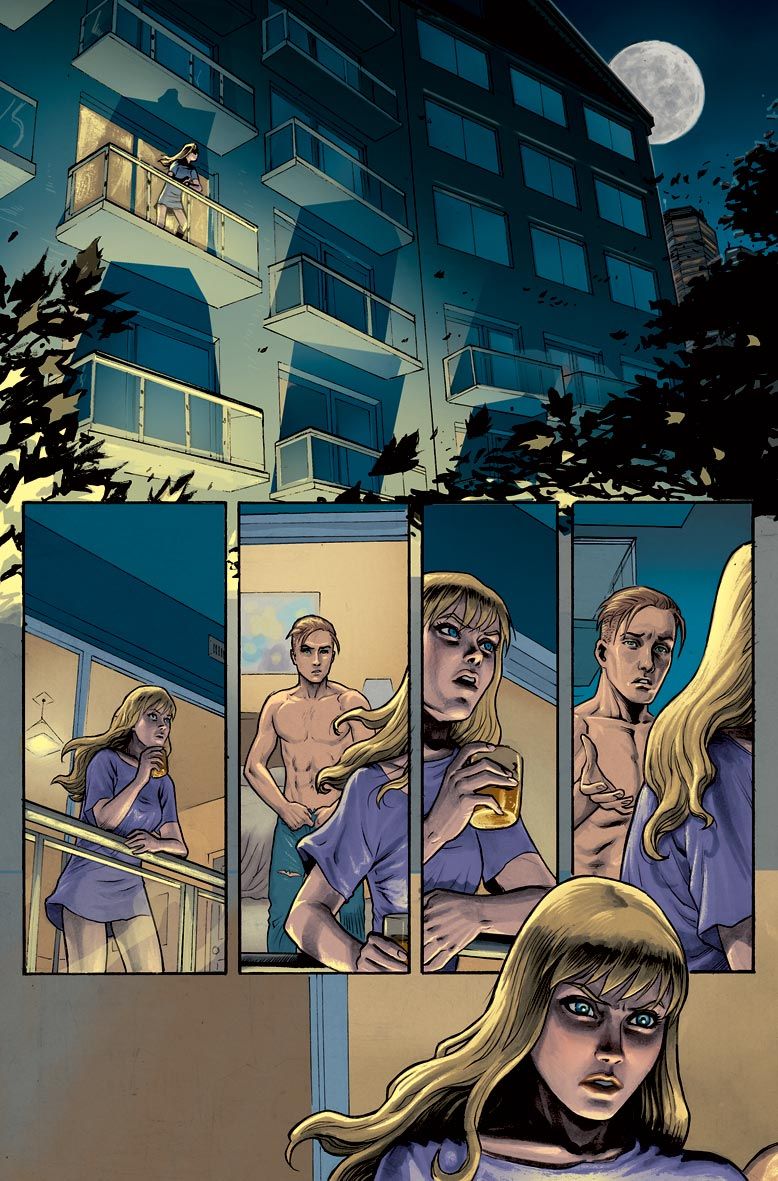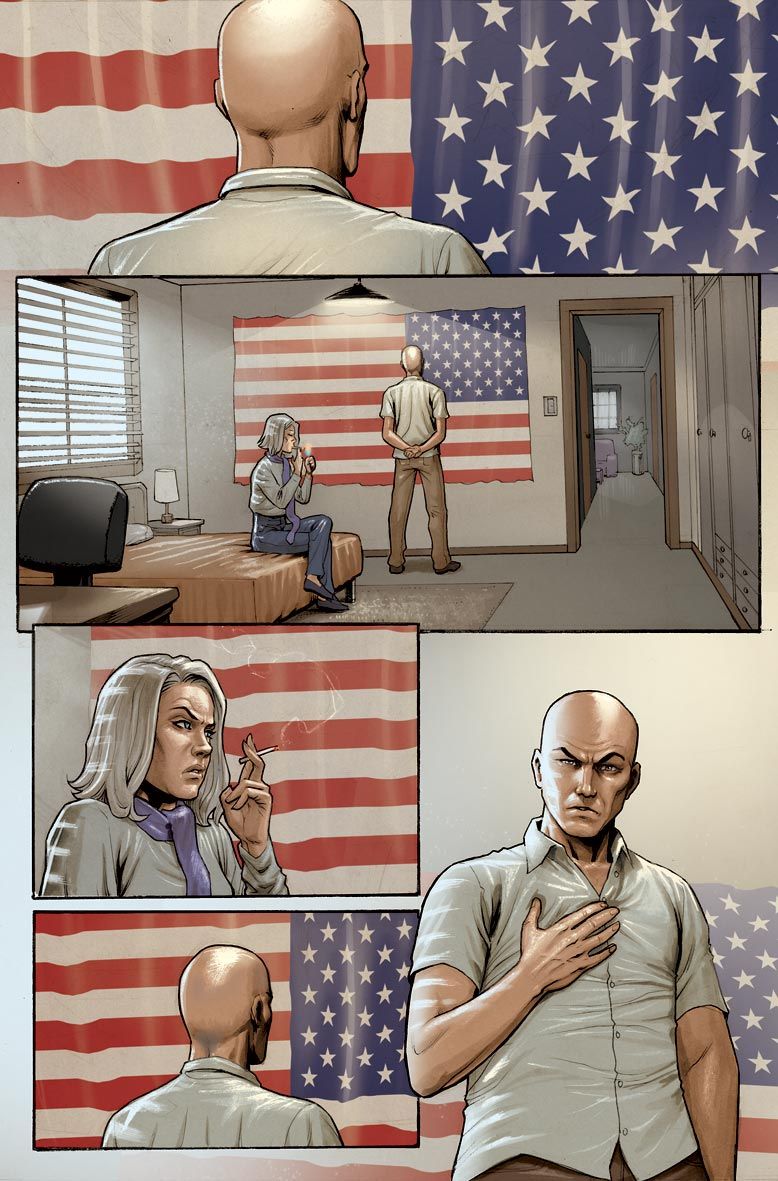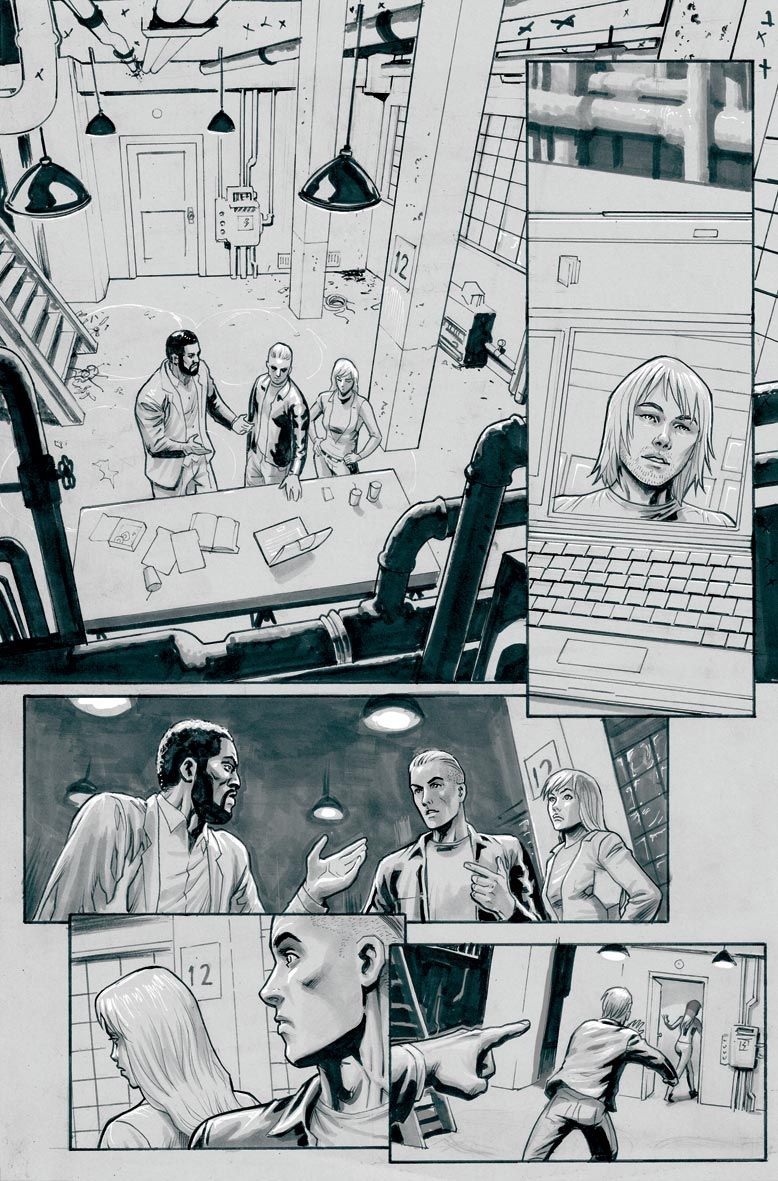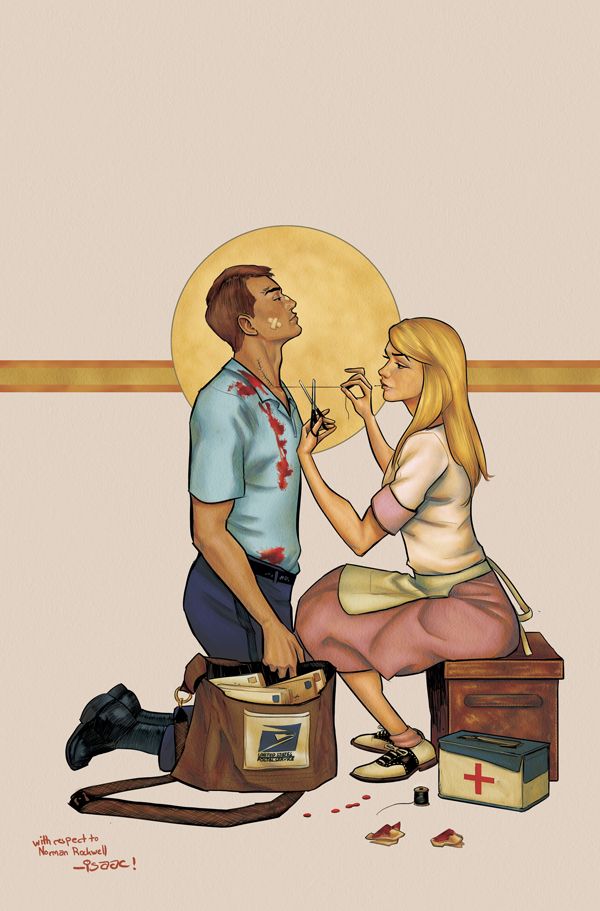This summer, Matt Hawkins ("Symmetry"), Bryan Hill ("IXth Generation") and Atilio Rojo ("The Transformers: More Than Meets The Eye") are set to cross-over "Postal," "The Tithe" and "Think Tank," in a three-issue event titled "Eden's Fall," for Top Cow.
Tying together the grounded, realistic world the three books inhabit, the event series set out to explore "justice done outside of the rule of the law" as Jimmy from "The Tithe" heads to "Postal's" Eden, Wyoming to pursue a sociopath that escaped him.
Hawkins and Hill spoke with CBR about the project, discussing the real-world themes of the crossover, its accessibility for readers unfamiliar to the books, good old fashioned revenge, and much more.
When, and for how many issues, is the crossover running?
Matt Hawkins: We're targeting an August release for the three issue cross-over story event. We're calling it "Eden's Fall" and it includes characters from "The Tithe," "Postal" and "Think Tank." We've already had some subplot threads that link these together. It was intentionally subtle and not overbearing. I'm not a fan of the mega cross-overs that run 6-12 issues with 40 peripherally-connected additional books. This is a three issue contained series that came about organically from the stories in each of the titles. I like co-writing with Bryan he does snappier, more concise dialogue than I do so we decided to split the plot/scripting duties on this one.
RELATED: Top Cow's "Postal" Variants Homage Norman Rockwell's Classic Paintings
How did the crossover idea come about?
Bryan Hill: Matt talked about wanting to unify his narrative worlds into one story and then that story showed up, LOL. He talked to me about it and I thought it made sense; it allowed exploration of these three worlds from a different perspective. I'm scripting, but this is Matt's story, Matt's vision for this project. It's not easy unifying three different stories into one story, and he's done an impressive job making that work narratively and emotionally.
MH: In "Tithe" V1 I dropped a couple vague references to a place in Wyoming where the fugitives could go hide and get new identities. This referecend the city of Eden in the "Postal" series. In "The Tithe" V2 Dr. David Loren from "Think Tank" helped them out with some military hacking. At the end of "The Tithe" V2 one of the bad guys goes to Eden to hide out. This pisses off our FBI heroes from "The Tithe" and they want to go get him. It's important that it work for "story" so many of these cross-overs feel forces. We also don't do them very often and let it happen organically. This is a real world with realistic people. There's no supernatural, no super powers, just extraordinary people caught in difficult circumstances.
The idea of having a character from "The Tithe" go into Eden from the world of "Postal" is a great set-up for a tense, violent drama. The story is the answer to a simple question: What if someone from "The Tithe" needed to go into Eden to get a man who got away with horrible crimes?
BH: Revenge is a motivation in the story and that's always a way to wake me up, LOL. You have a story about revenge? Really? Count me in. Hahahah. I own five Punisher T-shirts.
There's also a love story at the center of it, and that compelled me. Love and revenge don't usually survive each other. One of them tends to win out in the end. I get bored by concepts almost instantly, and plot only serves to explore character for me. Matt built a story with a great concept, but it also gives me room to explore human frailty within that concept.
Why these titles in particular? Do you have to be a reader of all, or any of them, to enjoy the crossover?
MH: This story is designed to be self-contained and people who've never read any of these titles will be able to jump in and read this without confusion.
BH: That's important to me. We'll have a break down of the world state at the head of the comic so every reader will know what they need to understand the story. Obviously, if you've read "Think Tank," "The Tithe" and "Postal" you'll get a richer experience, but if you're a new reader and you want to pick this up you won't be lost. One of the goals of this series is to introduce new readers to these books and if they dig the vibe of them, they can follow any of the stories and get deeper into their respective worlds.
What unifies these books is that they're all grounded in real world possibility, and thematically they deal with different aspects of crime, government and technology. They're related to each other because they're in the same world: our world.
Atilio Rojo is providing the art for the series - why did you choose him for the crossover?
MH: I worked with Rojo on "IXth Generation" after "Stjepan Sejic" left the book. His expressive characters sold me. He also filled in and did some pages from the "Postal Dossier" and he can make ordinary scenes look interesting. This is important as we don't have people throwing cars or shooting energy blasts.
How would you describe the tone of the crossover? Does it more closely resemble one particular series?
BH: Hmm. Good question. Well the bulk of the series takes place in Eden, the small town at the center of "Postal." It's a town full of criminals, people that want to live off the grid, start new lives and avoid government interference. Some of them are fugitives, others are looking for redemption, but all of them want to be left alone. "Postal" is a Norman Rockwell painting, if there was blood in the color. That's how I describe it.
The scripting has my style, so in that sense it will feel similar to "Postal." I like strong, stark imagery and economy. I'm not a writer that likes to be noticed when someone is reading a book. I like being invisible and making sure the reader is getting an emotional experience. That perspective runs through "Eden's Fall," for sure.
There are a lot of characters at play between the three titles. Who would you say is the protagonist of the series, if there is one?
BH: Jimmy, from "The Tithe," is the driving force of this story. He's an FBI agent going undercover into Eden (without official approval) to pursue a sociopath that escaped him (in the last arc of "The Tithe"). This is a story about his quest and its consequences. That's fun for me because usually when I write Eden it's from the point of view of Mark, the mailman of the town (and its resident detective) so being able to see this place and these characters from another character's POV is especially fun to do.
The characters in each book are in some way looking to uncover a "truth." Are the "truths" in each series linked in any way?
BH: Truth is, at best, elusive but it's likely completely subjective. To me, and I might have a different take on this than Matt, Matt's books are about justice in one form or another. "Think Tank" is about the just use of technology. "The Tithe" is about the justice and injustice in religious doctrine, and the government agencies built to protect us. "Postal" is about a small town, full of dangerous people, that's trying to keep its own sense of justice because they felt there was none in the outside world.
"Eden's Fall," put simply, is about an FBI agent that feels justice wasn't done, who is taking it upon himself to pursue a bad man who fell through the cracks of the systems built to stop him. It's about justice, justice done outside of the rule of law.
My personal belief is that justice and law aren't always related, not the way they should be. Most people who read and love comics have part of them that is willing to accept action outside of the law - as long as that action matches our sense of morality. The books Matt created, "Postal," "Think Tank" and "The Tithe" are all moral explorations. "Eden's Fall" continues that, uniting these characters around that theme.
Each series -- "Tithe" and "Postal" especially -- delves into the notion of people in authority trying to "play God." How does the crossover continue the exploration of that theme?
BH: Well, that's the problem when we obsess with justice, isn't it? Both atheists and believers can become zealots. The villain of "Eden's Fall," Thornton, believes that the lives he takes are insignificant because he's serving the will of his God. He's found the most dangerous thing any person can find: justification. I fear zealotry, among believers and non-believers alike. Any thought, no matter how noble its birth, gets poisoned by extremity. For me, that's the pinpoint. I love exploring how good intentions are corrupted by extremity. We'll definitely wrestle with that in "Eden's Fall."
"Think Tank" has a more global scope than a series like "Postal," which has stayed pretty much in Eden, Wyoming. How do the global events of "Think Tank," and national focus of "Tithe," factor into the event, which seems to focus on Eden?
MH: This is a contained story about trying to take down a single bad guy that got away with some heinous stuff in "The Tithe" V2. It focuses on Eden but the characters from the various series all take part. It probably has the least effect on "Think Tank" where Loren is essentially offering technical support. The military isn't helping them, David is doing it clandestinely. The characters most affected by what happens are from "The Tithe." There will be some permanent ramifications that lead directly into the third arc of "The Tithe" I'm planning for next year which will be called Samaritan.
You touch on a lot of social and political themes in each series, timely to the current situation in America, and issues being discussed in the presidential race. Does the crossover have the same kind of relevancy?
BH: I think so. Look, no one likes to get beat over the head while reading, so "Eden's Fall" won't be a cathartic diatribe of our socio-political worldview, but Matt's stories are reflective of our world and its difficulties. Fiction is either symbolic or reflective, usually a bit of both. Relevancy isn't really for the writer to decide. That's for the reader, governed by their experience with the story. I can write a story about President Obama playing pinochle with Vladimir Putin and Kim Kardashian and that doesn't mean it's relevant.
What I can do, as a writer, is make sure the story is honest. I can make sure it engages its ideas and concepts with as much personal honesty as I can muster. I'm a writer. My job isn't to tell readers what matters. My job is to bleed. I hope that's relevant to readers, but the final judge of success lies in the experience people have with the book. Writing is the strange, spooky art of playing god while remaining completely humble to the people reading your work. When writers start pontificating about the relevancy of their own work, humility is the first casualty and boredom is usually the result.
How does the crossover impact each series going forward?
BH: Story worlds aren't stones. They're soft clay. Everything that touches them affects them in some way. I can't give away plot details but for readers of "Postal," "Think Tank" and "The Tithe" there are serious ramifications for each of those worlds. Stories are about characters making choices and in order for a choice to matter it must have a consequence. The events of "Eden's Fall" will have consequences that affect everyone within it. That much I can promise.
The first issue of Top Cow's "Eden's Fall" crossover is planned for release in August.

